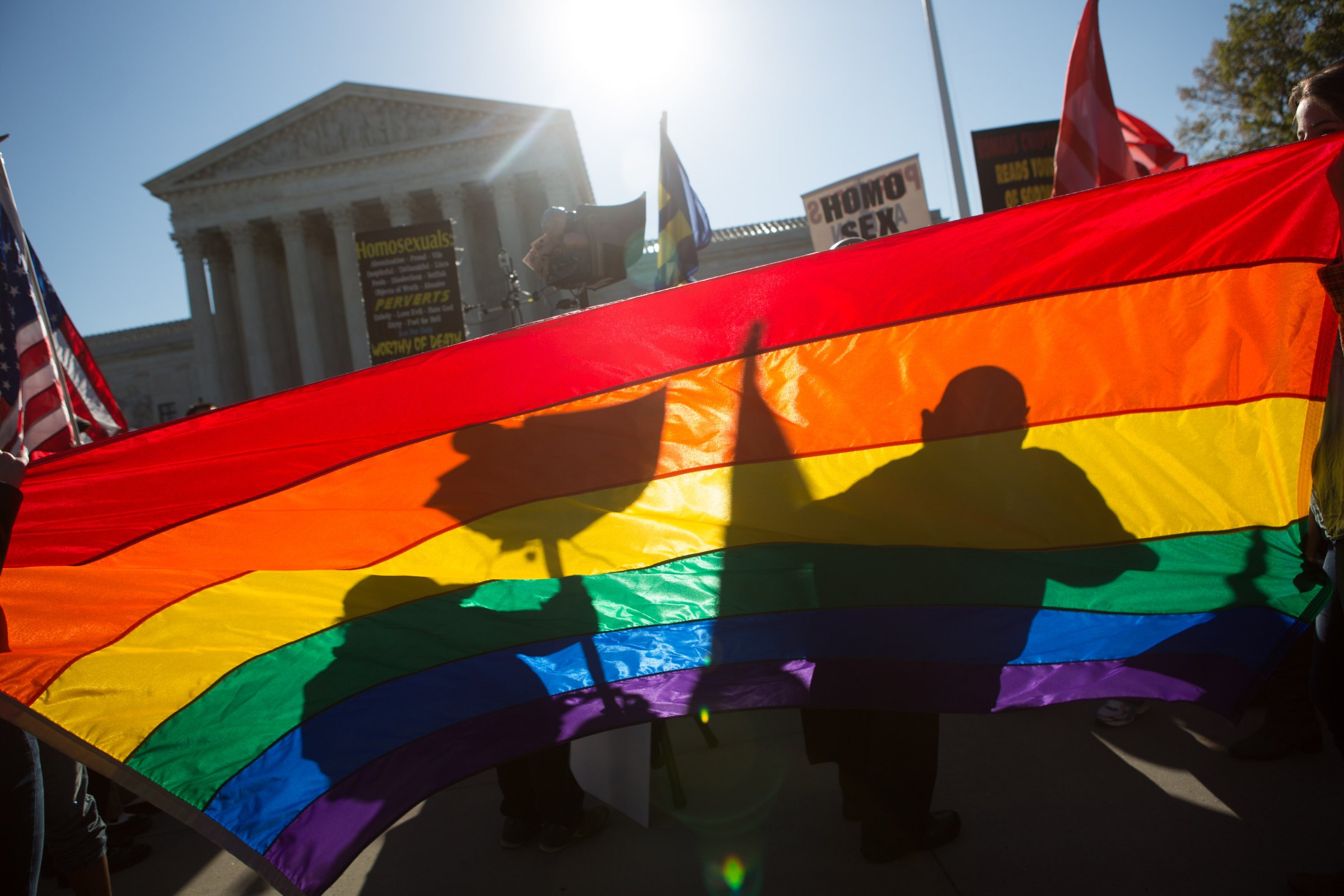
Daniel Alter is Adjunct Professor and Senior Fellow at New York University School of Law and was recommended to Gov. Andrew Cuomo last year by the NYS Commission on Judicial Nomination as a candidate for the NYS Court of Appeals.
Last week I listened to the oral arguments in Obergefell v. Hodges—the case in which the Supreme Court justices will decide whether there is a right under the U.S. Constitution for an individual to marry a person of the same sex. As a man who is married to the man he has loved for 27 years, I wanted to hear the best legal argument for why people like me should not have the same opportunity as opposite sex couples to wed their chosen partners. What I heard made no sense.
The lawyer for the State of Michigan, one of the four states defending their prohibitions against marriage between two men or two women, argued in favor of the ban. He said that the state’s fundamental purpose in maintaining the institution of civil marriage seeks “to forever link children with their biological mom and dad when that’s possible.” He insisted that marriage “was never intended to be dignitary bestowing” on the married couple, and that “dignity may have grown up around marriage as a cultural thing, but the State has no interest in bestowing or taking dignity away from anyone.”
He warned the justices that if they changed the meaning of marriage from a union based on the biological bond between parents and children to one based on the emotional commitment between adults, then adults could think that marriage was more about adults, and not about kids. He argued that the supposed change would strike a grievous blow against the integrity of marriage between heterosexuals. He also predicted that it would cause more children to be born outside of marriage.
I was surprised. This was the best legal argument that opponents of marriage equality could muster? That spousal commitment was subordinate to parental obligation, and that marriage equality would result in the narcissistic meltdown of the “traditional” nuclear family? In response to these remarkable claims, the lawyer challenging the ban aptly observed that “one casualty of the marriage litigation is an impoverished view of what marriage is and what is the role of biological procreation.”
Although I faulted Michigan’s argument, I also questioned my point of reference. After all, I’m from New York, and it’s at least possible, I thought, that Michigan residents have a distinctly different view of marriage than the one that has shaped my understanding of the institution. So I did a little research, and after five minutes or so online, I found a wonderfully informative document. The Michigan Association of Mayors, in coordination with the Michigan Municipal League, published The Civil Marriage Ceremony Handbook for Mayors. It offers step-by-step instructions for officiating civil marriages in Michigan. It also explodes the state’s argument against marriage equality.
The handbook includes five sample ceremonies from which mayors in Michigan are encouraged to draw when performing weddings. None of these samples ever mentions children, much less the primacy of procreation. And in addition to the standard vows to “love, honor, and keep” your spouse “in sickness and in health,” two of the sample ceremonies notably include a section entitled, “explanation of marriage.”
According to one, marriage is a “most serious” union because “it will bind you together for life in a relationship so close and intimate that it will profoundly influence your whole future.” It explains that, because “you rest the security of your wedded life upon the great principle of self-sacrifice,” you “begin your married life by the voluntary and complete surrender of your individual lives in the interest of that deeper and wider life which you two have in common.” As a result, “you will belong entirely to each other; you will be one in mind, one in heart and one in affection,” and from that commitment “you can expect the greatest measure of earthly happiness that may be allotted to each of you.”
Another sample ceremony in the handbook offers a similar explanation of marriage. It states that married couples “will become united in a special new way.” They “bring the fullness of their hearts to share with one another; they bring the dreams which bind them together in spirit,” and “they bring their individuality, which will be preserved, but out of which will emerge their life together.”
These words describe the profound dignity of the marital relationship recognized by all states—not just Michigan. The mayor’s handbook recognizes marriage as an “honorable estate,” and this status cannot simply be dismissed as some “cultural thing” that evolved to disguise the institution’s true essence.
Love, respect, and mutual support between spouses is the quintessence of marriage today. It is the fundamental commitment from which the parent-child bond draws strength, not weakness. And the antagonistic theories of child-centric versus adult-centric marriage postulated by Michigan’s lawyer to justify discrimination create a false dichotomy. As overwhelming historical experience confirms, spousal and parental relationships do not inherently compete for emotional succor.
The Supreme Court argument last week made one point clear: Besides “marriage,” there is another definition at the center of this debate. The Merriam- Webster dictionary defines “sophistry” as “the use of reasoning or arguments that sound correct but are actually false.” Hopefully, a majority of Supreme Court Justices will know it when they see it.
More Must-Reads From TIME
- The 100 Most Influential People of 2024
- The Revolution of Yulia Navalnaya
- 6 Compliments That Land Every Time
- What's the Deal With the Bitcoin Halving?
- If You're Dating Right Now , You're Brave: Column
- The AI That Could Heal a Divided Internet
- Fallout Is a Brilliant Model for the Future of Video Game Adaptations
- Want Weekly Recs on What to Watch, Read, and More? Sign Up for Worth Your Time
Contact us at letters@time.com